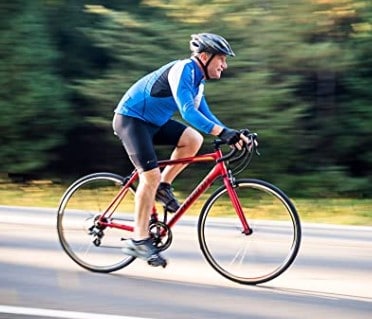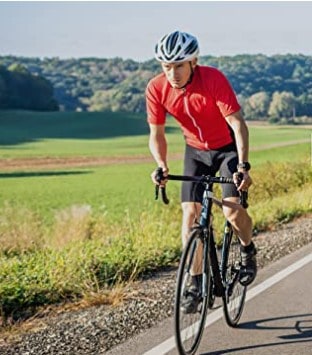Cycling is a fantastic workout for weight loss, heart health, and muscle building, among many other health benefits. The health benefits, however, can only be realized if you cycle more regularly and longer. Now, how many miles should you bike a day?
Generally, beginner cyclists should bike 5-10 miles a day, depending on their cycling goal, age, fitness level, and cycling route. In contrast, experienced cyclists can hit 20-50 miles a day, also depending on their cycling goal, age, fitness level, and cycling route.
We are going to look at how all these factors affect your cycling speed and mileage. We’ll also discuss the importance of cycling and look at some frequently asked questions.

So, How Many Miles Should You Bike A Day? Determining Factors
For us to answer this question, we’ve to consider these factors:
- Cycling goal
- Age and fitness
- Biking route
- Cycling experience
Let’s get into it.
1. Cycling Goal
Knowing why you are cycling will help you determine how long you should bike a day.
If your goal, for example, is to keep fit and lead a healthy life, then cycling at an average speed of 10-12-mph will do.
And if you are a beginner looking to keep fit, it’s advisable to start with 30 minutes a day. So, it means doing 5-6 miles per day.
Once you are comfortable biking 5-6 miles for 30 minutes every day, you can step up and do an hour. In that case, you can hit 10-12 miles a day.
But, what if you are cycling for competitions? How many miles should you cycle a day?
In such a case, you’ve to push yourself more.
While it’s normal to start with 10 miles a day, you should be able to hit 20 miles a day by the end of your first month and 30 miles in your second month.
So, by the time you are in your fourth month, you should average 50 miles a day.
Remember, however, that you don’t have to hit 50 miles every day not to overwhelm your body. Therefore, sometimes you have to do fewer miles and slow down.
What if your goal is to lose weight? How many miles should you cycle per day?
Overall, the cycling mileage depends on how many calories you want to lose. For example, a guy who weighs 130 pounds sheds about 36 calories each mile while cycling at 12mph.
Someone heavier who cycles faster will burn more, however. Nonetheless, on average, doing at least 1 hour a day, equivalent to 12 miles, is okay for beginners who bike for weight loss reasons.

2. Age and Fitness
Generally, younger and fitter cyclists cover more ground than older cyclists who are not very fit.
So, how long should you bike a day when fit?
A young, healthy cyclist can comfortably do 10 miles or more a day, while an older adult with health complications may struggle to hit 5 miles a day.
On the flip side, an older cyclist who is healthier and used to cycling can complete 10 miles a day comfortably, while a young cyclist with a health issue may struggle to exceed 5 miles.
3. Cycling Route
Therefore, how many miles can you bike a day off-road and on-road?
If the terrain is hilly, you are likely to push yourself harder, which means you will get tired faster.
In such a case, it may be harder to hit 10 miles a day while it’s possible to reach such mileage on-road.
Logically speaking, you cannot compare a 10-mile ride on hilly terrain to a 10-mile ride on flat urban roads.
4. Cycling Experience
We don’t expect an experienced cyclist to ride at the same speed and cover the same mileage as a beginner. The longer you’ve been cycling, the more ground you are likely to cover.
So how many miles should you cycle per day?
While beginners are likely to start with 5-10 miles depending on their fitness level, experienced cyclists can comfortably hit 20-50 miles a day, depending on their fitness level.

Takeaway – How Many Miles Should I Bike A Day?
After the above discussion, here are the key takeaways:
- Cycle for 5-6 miles a day if you are a beginner trying to keep fit. You can, however, get to 10-12 miles once hitting 5-6 miles a day becomes more manageable.
- If your goal is to train for cycling competitions, start with 10 miles a day and be able to hit 20 miles by the end of your first month. You can then do 30 miles a day the second month and up to 50 miles during your fourth month and after that.
- Consider starting with 10 miles a day as a beginner who’s looking to lose weight. Once you build some endurance, you can do double the mileage.
- If you are young and healthier, you can do 10 miles a day more comfortably. In contrast, if you are old and weak, don’t try to do more than 5 miles when your body cannot take it.
- Consider starting with 5 miles a day off-road if you are a beginner, but you can double the mileage if you are more experienced.
What Are the Health Benefits of Cycling Daily or Regularly?
Here are six primary reasons why cycling is good for you:
a) Weight Loss
According to a Harvard University study, biking hastens calorie burn. It allows you to shed extra calories much faster, and that’s critical in losing weight.
The study shows that you can lose up to 375 calories in 30 minutes if you cycle at an average speed of 14-16mph.
b) Mental Wellbeing
One study by Central YMCA shows that regular cycling boosts mental health by 32%.
According to the study, cycling is a fantastic stress buster and anti-anxiety factor. It generally saves you from having to process many things and thus improves your mental outlook.
c) Heart Health
Cycling doesn’t just benefit your physical and mental wellbeing but your heart health too. It improves your heart rate, prevents bad cholesterol buildup, and boosts circulation.
That’s according to recent research by The BMJ. The study further shows that cycling prevents heart disease.
d) Immune Boost
Did you know that cyclists take fewer sick leaves at workplaces? That’s according to a recent study by the Appalachian State University.
The study likens cycling to running and walking, which are known to boost one’s immunity.
e) Muscle Building
Biking not only helps you shed extra calories but also strengthens your muscles and builds your endurance. The more you cycle, the stronger your muscles become.
The workout mainly focuses on your calves, quads, hamstrings, and glutes.

f) Cognitive Enhancement
Cycling has a significant impact on your brain health. It enhances circulation to the head, and that means better cognitive functions.
In that case, you get to think faster and are less likely to suffer neurological disorders such as Dementia and Alzheimer’s later in life.
FAQs
1. How Far Can You Bike In A Day?
The average cycling distance depends on age, fitness, route, and cycling goal. If you are young and fitter and want to train for competition, you can do 20-50 miles a day.
Conversely, if you are only cycling for fat and general fitness, you should do 5-10 miles a day or up to 20 miles if you commute.
2. Is Cycling 3 Miles A Day Good?
With most beginners averaging 5-10mph, depending on the fitness level, that means 3 miles a day is not good enough.
Unless you are old and sick, you won’t get much from cycling 3 miles a day. You should at least do 5 miles.
3. Is 1 Hour Cycling A Day Good?
Most healthy beginner cyclists average 10mph and often go an hour or more. So, an hour of cycling is a good starting point.
Note, however, that you may have to do more hours to lose more weight or prepare for a cycling competition.
4. How Many Miles On A Bike Is A Good Workout?
A good workout takes about 30-60 minutes at a moderate speed of 10-12mph, depending on the route. If you ride off-road, you can do 30 minutes, equivalent to 5-6 miles.
But if you ride on urban roads, you should do an hour, which is equivalent to 10-12 miles.
5. How Long Should You Bike A Day To Lose Weight?
If you cycle at an average speed of 12mph, you will likely burn 240 calories for every half an hour that you cycle. So, you could lose 480 calories an hour, which is enough for a day when starting.
6. Is Biking 10 Miles A Lot?
A healthy beginner cyclist averaging 10mph will take an hour to complete 10 miles. That’s not a lot. It can only be too much if you have an underlying medical condition or are just too old to cycle long distances.
Relevant Posts:
In Summary – how many miles should you bike a day?
As seen, your daily cycling distance depends on your age, fitness, cycling goals, route, and biking experience. So, you have to consider that when deciding on the mileage.